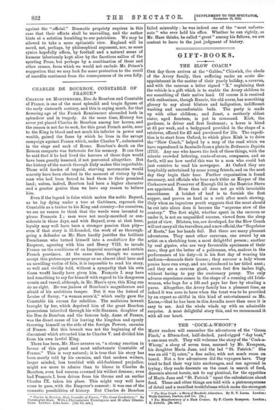CHARLES DE BOURBON, CONSTABLE OF FRANCE.*
CHARLES DE MONTPENSIER, Duo de Bourbon and Constable of France, is one of the most splendid and tragic figures of the early sixteenth century, and this is saying much, for that flowering age of the French Renaissance abounded both in splendour and in tragedy. At the same time, History has never yet placed Charles de Bourbon among her heroes, and the reason is not far to seek, for this great French noble, near to the King in blood and not much his inferior in power and wealth, gained the fame by which he lives in the savage campaign against France which, under Charles V., culminated in the siege and sack of Rome. Bourbon's death on the Roman ramparts was fortunate for his memory. It can thus be said that if he had lived the horrors of those days would have been greatly lessened, if not prevented altogether. But the history of the march through Italy makes this improbable. Those wild hordes of unpaid, starving mercenaries would scarcely have been checked in the moment of victory by the man who had been forced to lead them to their promised land; unless, indeed, Bourbon had been a higher character and a greater genius than we have any reason to believe him.
Even if the legend is false which makes the noble Bayard, as he lay dying under a tree at Gattinara, reproach the Constable as a traitor to his King and country—for ourselves, we see no reason to think that the words were invented to please Francois I.; men were not mealy-mouthed or con- siderate in those days, and with Bayard, even at that hour, loyalty may well have been a stronger passion than pity— even if that story is ill-founded, the work of so thorough- going a defender as Mr. Hare hardly justifies the brilliant Frenchman who turned himself into a conclottiere for the Emperor, agreeing with him and Henry VIII. to invade France on the conditions of an Imperial marriage and certain French provinces. At the same time, though we cannot accept this picturesque personage as an almost ideal hero and an unwilling victim of fate, it is impossible to read his story, so well and vividly told, without a sympathy that his own times would hardly have given him. Francois I. may have had something to say for himself with regard to his dangerous cousin and vassal, although, in Mr. Hare's eyes, this King can do no right. He was jealous of Bourbon's magnificence and afraid of his ambitious temper. But it was the hatred of Louise of Savoy, " a woman scorn'd," which really gave the Constable his excuse for rebellion. The malicious lawsuit brought by her, which deprived him of the great Bourbon possessions inherited through his wife Suzanne, daughter of the Dnc de Bourbon and the famous lady, Anne of France, was the direct cause of his leaving the kingdom and openly throwing himself on the side of the foreign Powers, enemies of France. But this lawsuit was not the beginning of the discontent which attracted him to Charles V. and divided him from his own lawful King.
There has been, Mr. Hare assures us, "a strong reaction in favour of this great and most unfortunate Constable of France." This is very natural; it is true that his story has been mostly told by his enemies, and that modern writers, larger minded, less troubled with old-fashioned prejudice, might see more to admire than to blame in Charles de Bourbon, even had success crowned his wildest dreams; even had Francois I. been driven from his throne and an earlier Charles IX. taken his place. This might very well have come to pass, with the Emperor's consent: it was one of the romantic possibilities of history. But Charles de Bourbon
• Charles de Bourbon, High Constable of France, " The Great Condottiere." By Wells Gardner, Darton, and Co. [6e. J Christopher Hare. With a Photogravure Frontispiece and 16 other Dlustra- t The Mieadvesteres of a Hack Cruiser. By F. Claude %alopecia. London t
tions. London John Lane. [12s. 63. net.] E. Arnold, [6e. net.]
failed miserably : he was indeed one of the "most unfortu- nate " who ever held his office. Whether he can rightly, as Mr. Hare thinks, be called " great " among his fellows, we are content to leave to the just judgment of history.


































































 Previous page
Previous page